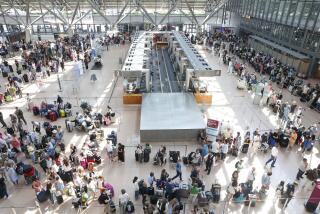Attuned to Assortment of Perils, Nation’s Capital Grinds to Halt
- Share via
WASHINGTON — Even before a drop of rain fell, this city was paralyzed.
The subway and bus systems shut down for the first time, the federal government and most businesses closed, the House and Senate adjourned early for the week and Air Force One was flown to Georgia for safekeeping.
The precautions as Hurricane Isabel approached were unusual, even in a city that has weathered a string of emergencies -- from anthrax scares to sniper shootings to international meetings that draw hordes of angry protesters. The response to the storm reflected a city that has become so focused on protecting itself that it is wired to prepare for the worst.
By late Thursday, winds in Washington were gusting up to 58 mph, with sustained speeds of 30 to 40 mph, said Cindy Woods of the Sterling, Va., forecast office of the National Weather Service.
At 10 p.m. EDT, more than 270,000 homes in the metropolitan area were without power, according to the Potomac Electric Power Co., the local utility. Some trees and power lines were down.
Ahead of the storm, schools and local governments near the District of Columbia announced that they would close.
And the nation’s capital discovered the power that its mass transit system wields after the Washington Metropolitan Area Transit Authority said it would close its entire system at 11 a.m. Thursday.
Much of the rest of the city then followed suit.
The federal government announced that it would be closed, except for emergency operations, triggering a cascade of other closings at offices, universities and private businesses.
Scott Hatch, director of communications for the federal government’s Office of Personnel Management, said concern for workers’ safety factored into the decision to shut the government.
“But the primary cog in this wheel is Metro,” Hatch said. Once the transit authority decided to stop running its buses and trains, he said, the government’s decision became easy. A large percentage of the 300,000 federal government workers rely on public transit, he said.
Late Thursday, Hatch announced that government offices are to remain closed today.
The federal government has closed six other times since 1990, each because of snow. Thursday was the first time a hurricane or tropical storm prompted a closure since the Office of Personnel Management started keeping records in 1978.
Most lawmakers and President Bush headed out of town Wednesday, while Washington’s skies were still clear.
Bush, who was riding out the storm at the Camp David presidential retreat in Maryland, said officials from the Federal Emergency Management Agency and the Department of Homeland Security were keeping him up to date on the storm’s progress.
At Camp David, the president met with Jordan’s King Abdullah and Queen Rania.
In Washington, White House workers made sure runoff drains were clear.
The House met in a five-minute session, but the Senate was dark and all public hearings and meetings were canceled.
Staff members with pressing business, such as Senate aides working on the energy bill, toiled for a few hours. By 1 p.m., the parking lot of the Capitol was all but empty, even though the weather was calm, said Marnie Funk, spokeswoman for the Senate Energy Committee.
Along with flashlights, batteries and toilet paper, one of the hottest commodities in town was one that many residents had never used: sandbags.
The city’s Department of Public Works began distributing the low-tech water barriers Tuesday, and by midday Thursday had filled at least 8,000 bags with more than 100 tons of sand, officials said.
Hundreds of cars snaked through and around the largely deserted D.C. General Hospital complex where the bags were given out, with people waiting as long as three hours.
“My hope is that the residents who got them know what to do with them,” said Mary Myers, a public works spokeswoman. “In an old city like this, your risk of flooding comes as much from storm drains as from the ground. So sandbags may help you -- and they may not.”
Grocery stores did a booming business. Lines stretched all the way to the back of the store at the upscale Whole Foods in a downtown neighborhood.
Jennifer Howard, 40, a freelance writer and editor, waited 45 minutes in a checkout line.
She shopped for the ingredients for chili and chocolate chip cookies and, inspired by the storm, bought milk with a long shelf life.
“I bought it more because I felt I should than that we’re going to need it,” said Howard, the mother of a 1-year-old.
*
Times staff writers Vicki Kemper and Maura Reynolds contributed to this report.
More to Read
Sign up for Essential California
The most important California stories and recommendations in your inbox every morning.
You may occasionally receive promotional content from the Los Angeles Times.













